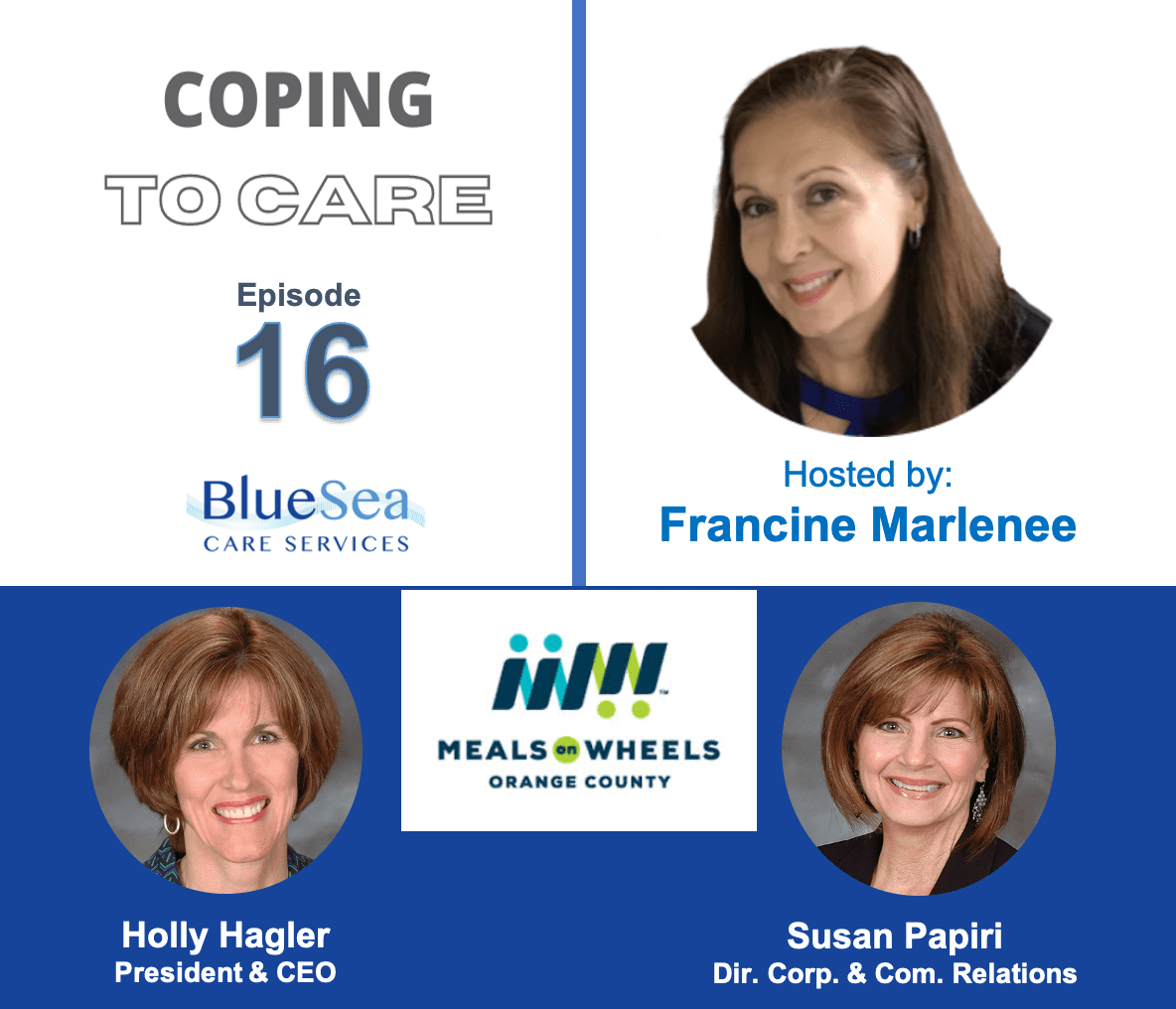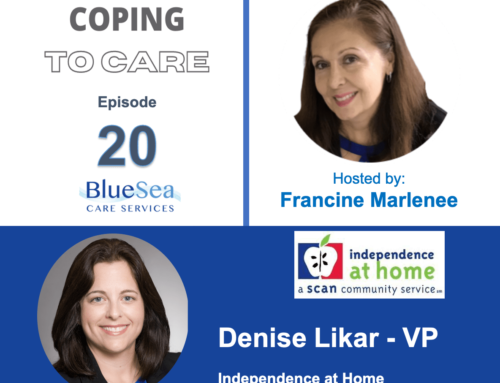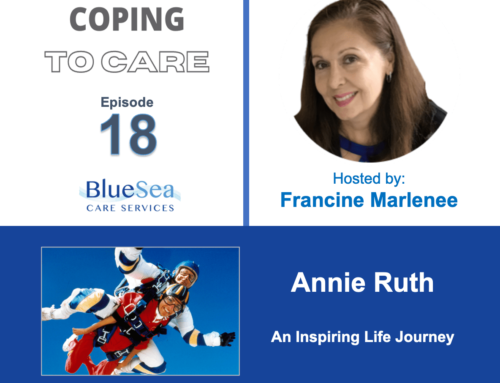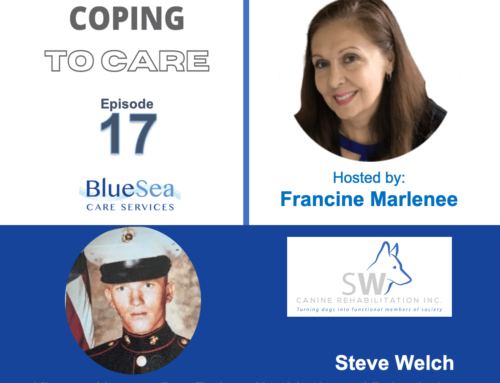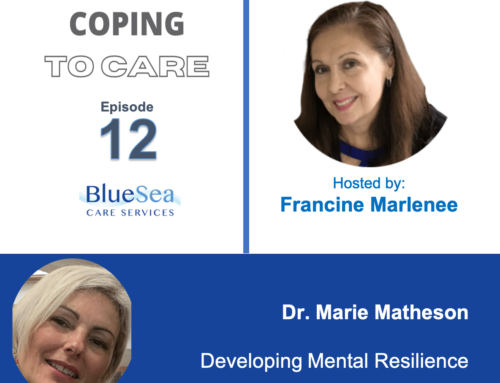Meal On Wheels – Orange County
For over 50 years, Meals on Wheels Orange County, has been the largest nonprofit senior nutrition and supportive service provider in Orange County, serving nearly one million meals to over 10,000 at-risk older adults annually. Their programs and services reduce hunger and improve wellness for older adults so that they may live independently in the homes and communities they love. For our Coping to Care podcast, we were honored to interview our friends Meals on Wheels Orange County President & CEO Holly Hagler and Susan Papiri, Director, Corporate & Community Engagement.
They know the need for good nutrition for seniors, especially those with chronic conditions, is very crucial to good health. So we asked them to share about the work and coordination that goes into this at Meals on Wheels Orange County.
Ensuring Good Nutrition For Seniors
According to Holly, one of the things they really focus on is food insecurity. Food insecurity is defined as limited or uncertain access to adequate food for wellness. And what a lot of people may not realize is that nearly 30% of low income older adults in their community suffer from food insecurity. That’s almost a third. And that has doubled since 2012. So they look at both providing food and solid nutrition, regardless of income.
It has been found that roughly half of all older adults, regardless of income, are malnourished when they are hospitalized, and that could be from inability to make good healthy meals, or whatever their disease condition is. So the other thing that is important is ensuring that they are providing the balanced nutrition that helps promote wellness. One of the reasons this is so critical is that about 50% of all diseases that older adults have, are directly connected to lack of appropriate nutrition intake. And 60% of food insecure older adults have congestive heart failure, and 50% more are likely to have diabetes, and so on.
So one of the things that they do is serve meals on wheels delivered to older adults at home who are not able to shop or make their own meals. Or they also serve hot meals at senior centers or, during COVID, frozen meals that are being picked up. But everything is overseen by a registered dietician and they must meet national standards for the meals that they make. So they look at sodium and have low sodium meals. They look at what the calorie count is, they look at the nutritional value in terms of vitamins and minerals that are in each meal, and they have to meet these really rigid national standards and ensure there’s sufficient protein so that seniors remain strong. As many know, loss of muscle tissue is a real major issue for older adults that can cause weakening. Having the right balance of protein and carbohydrates is really important. So they design that into all of their meals. And they also have diabetic friendly meals.
Meals are usually delivered by a friendly volunteer driver who takes a few minutes to have a little conversation, ask how the senior is doing today, and they build a relationship. They provide both the meals as well as social connections. And then when they go to the senior centers, it’s not about just getting a meal, it’s about sitting at a table and socializing with people in the community. So they always say, “It’s meals and more.”
Ensuring Senior Wellness, Purpose, and Dignity
Meals on Wheels provides proper nourishment for older adults. In addition, they help ensure their wellness, purpose and dignity. They offer Case Management, Adult Day Services, Friendly Visitors, and Care Coordination. They have a case manager assigned to each older adult, and when they are in taking them into the program, they go out and actually visit with them in the home and connect them with other resources because, a lot of times, they may not have access to good transportation, or they may need connections with health insurance companies, or medical. And so they make sure that they’re connecting them with those kinds of resources as well as their case management.
In addition to that, they have a limited amount of homecare funding that they can provide to maybe help them clean their home or personal care. So those are smaller services. But again, it’s for the most frail who are homebound and alone who really need that extra support. They also provide Adult Day health care services which are medically supervised daycare. And this is for very frail, older adults who usually have seven or eight health issues, are on multiple medications, then they get their blood pressure checked there, may have mobility challenges, and may be using a walker or a wheelchair.
They have activities, physical therapy, and occupational therapy that they do at their center, and socialization is always important. Then they take them home at the end of the day. So it helps them remain with their families, while staying healthy for as long as possible, until they need to have more around the clock kind of living situations and care coordination similar to what BlueSea Care provides.
Extended Senior Isolation Can Cause Physiological Deprivation
Susan shared about the Friendly Visitor program which is set up to make sure that seniors aren’t suffering physiologically from extended isolation and loneliness. She said that the startling statistic that some of us may not have heard about is extended loneliness can cause a physiological deprivation that is equal to smoking 15 cigarettes a day. So a Friendly Visitor comes in and spends an hour a week with one of their home-bound seniors, just speaking to them about their past or playing cards or doing a puzzle or whatever it is that they both are interested in can help immensely. It’s kind of the senior Match Game. They do have people who call and want to help but can’t deliver meals during the week. So the Friendly Visitor program may work better for them so they match them with someone with complementary interests, they get together and figure out when a good time for both of them to meet. Now, with the recent pandemic, they’ve had to get creative, and they’ve made it more of a telephonic thing. They’re hoping to get back to in person visits as soon as it’s safe. But it’s so important to have that contact, whether it’s telephonic or in person, so that they can stave off all of those other issues that can happen when they are lonely and isolated.
According to a Becker’s Hospital Review, most seniors may have just one contact a week. Susan says that especially now, they have come up with innovative ways to deal with isolation. So their case managers and CNAs all got together and started making phone calls and their activities person put together activity kits. For those whose loved ones couldn’t be home, they’ve been checking in on them and taking them meals. So they’ve been finding ways to make it work again.
Innovating to Help Seniors Live Happily at Home
Holly says they’ve had to pilot new things and fail forward, give other things a shot, then celebrate the successes. They learn from the setbacks and working closely with people creating an innovative environment. COVID blew the cover off the ball for everybody in terms of innovating and doing things differently. Meals and Wheels Orange County is now serving six times more meals than they would normally serve in a month. And if you would have told them back in February, that within a matter of weeks they would be doing that, they would have said, “No way! That’s not even possible!”
Like Meals on Wheels, BlueSea Care has also had to be innovative. We were doing our Art-to-Wellness Painting With Mom classes at the Seal Beach Fire Department and the Michael Landon Community Center in Malibu. And then we were also planning to do another class in Rancho Palos Verdes. But then in March, we pivoted and began virtual art classes to create socialization and reduce senior isolation. Today, BlueSea is doing virtual art classes every Saturday from 10 a.m. to 12 p.m. And we max out at 50. So we pretty much get a full class, and it’s a free class for seniors. So they’re having a lot of fun. Here’s the link to share with seniors: https://www.blueseacare.com/virtual-senior-art-classes/
Meals on Wheels is focused on programs that keeps seniors living at home. Holly says that’s the hallmark of what they do. She said that surveys show that 80% and even higher of older adults like to live in their own homes as long as possible. And so that’s really what they provide for them: services and support to make that possible. Cooking is huge. And when someone can no longer go to the grocery store safely, or maybe they have arthritis, and they can only lift their hands so far, and all the things and dexterity that cooking requires, or they’ve lost interest in cooking, and they just want to do whatever is convenient. So quite frankly, over 50% of adults in this country have to make a trade off each month between food and whether they’re going to pay their utilities, pay their rent, or transportation or their medications. So this is about providing both the support that people need, as well as takes away a big expense item if they’re getting the meals delivered to the home. So that is absolutely critical.
Ongoing Senior Assessment is Key to Keeping Seniors Healthy and Safe
Susan says that without their case managers for their home delivered meal recipients, they wouldn’t be able to do three quarters of what they do. When they speak with the person who is asking about the meals, they also determine through an assessment, and then through continued assessments through the months, what the needs for this person are. They’re in their home, but are they safely in their home? Because that’s something that they really need to know and they really focus on. It’s about keeping them in their home as long and as safely as possible. So do they have a mattress? Do they have a microwave? Can they put this food in the microwave and heat it up? Do they have cleared space? Do they have a ramp?
Their case managers have all kinds of ways of contacting other resources, or being able to access different small grants or donations, and get these people some of the things that they need. Susan said they had a blind man, in one room of a home that he was renting a trailer home. His Friendly Visitor found that he couldn’t sleep because he could hear rodents coming in through holes in the floor at night because his mattress was on the floor. So they got a handyman to come and repair the holes, and were able to get him a bed frame and box spring to get him up off the floor making him safe, not just physically but mentally. These are the things that they do that are much more than delivering a meal.
Helping Families By Helping Their Elderly Loved Ones
Holly said she received a call on her cell phone one day when she was working from home. It was a woman who was calling about meal services for her elderly aunt and mother who live in Seal Beach at Leisure World who were in their 90’s. They somehow had missed the delivery of their meals. She learned that it was because the beauty parlor had opened up and they had gone to get their hair done and missed the delivery. So she arranged to get the meals re-delivered to them.
Many a time, it’s not just the seniors that they serve. Seniors may be isolated alone because they have family elsewhere. Maybe they’re in another state, maybe they’re a couple hours away, maybe they’re just an hour away. But during the week, they work and they can’t get to their loved ones. And so they touch not only the senior by delivering a nutritious meal, but also that senior’s family member.
Normally, Meals on Wheels hosts a major fundraiser and a Senior Care Hero Awards event. It’s like the Academy Awards of the senior industry. And this would have been their 10th year doing it. They have about 650 people who come to the Grove of Anaheim and they honor people all through the care continuum. People are nominated and then they’re voted on. And then, just like the Academy Awards, they find out who the recipients of the awards for each category are. But because of Covid, they couldn’t do that this year. So they decided to push that off to 2021. But for this year, they produced a documentary to shine the light on how the community and their partners all came together with staff, and everybody involved, volunteers and so forth, to help this nourishment continue through this pandemic. Holly said, “It’s astounding, truly astounding how the community came together in such really a short amount of time to make sure that seniors were not deprived of nutrition. Here’s the documentary that that tells their story: https://www.mealsonwheelsoc.org/stepuptotheplate/
In closing Holly said, “This is the time to be kind to yourself and be kind to others because so often, we’re focused on others so much that we don’t take the time for ourselves. So do both. And I think we will all live a happier life if we do that.”
Susan concludes with, “I think that we all have now had a taste of what our homebound seniors feel every day since this pandemic started. We are used to being able to go out and do what we wanted to do when we wanted to do it, how we wanted to do it, with whom we wanted to do it. And all of a sudden, we couldn’t do that. So now I would really love for us all to hold on to that feeling. It’s an uncomfortable feeling. And we’re getting a little bit out of it now. But please hold on to that because that’s how our seniors feel. And it’s important to support our seniors so that they don’t feel so cut off.”

